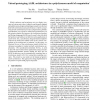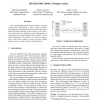141
click to vote
MEMOCODE
2008
IEEE
15 years 8 months ago
2008
IEEE
Equivalence checking is a classical verification method determining if a finite-state concurrent system (protocol) satisfies its desired external behaviour (service) by compari...
149
click to vote
MEMOCODE
2008
IEEE
15 years 8 months ago
2008
IEEE
While synchrony and asynchrony are two distinct concepts of concurrency theory, effective and formally defined embedded system design methodologies usually mix the best from both...
101
Voted
MEMOCODE
2008
IEEE
15 years 8 months ago
2008
IEEE
124
click to vote
MEMOCODE
2008
IEEE
15 years 8 months ago
2008
IEEE
We present a component-based description language for heterogeneous systems composed of several data flow processing components and a unique eventbased controller. Descriptions a...
129
click to vote
MEMOCODE
2008
IEEE
15 years 8 months ago
2008
IEEE
The second MEMOCODE hardware/software codesign contest invites participants to solve a practical hardware/software codesign problem within the time span of one month. The larger o...
114
click to vote
MEMOCODE
2008
IEEE
15 years 8 months ago
2008
IEEE
—Caches are commonly employed to hide the latency gap between memory and the CPU by exploiting locality in memory accesses. The cache performance strongly influences a system’...
125
click to vote
MEMOCODE
2008
IEEE
15 years 8 months ago
2008
IEEE
Concurrent programming languages are becoming mandatory with the advent of multi-core processors. Two major concerns in any concurrent program are data races and deadlocks. Each a...
123
click to vote
MEMOCODE
2008
IEEE
15 years 8 months ago
2008
IEEE
Abstract: We present an implementation of a highthroughput cryptosorter, capable of sorting an encrypted database of eight megabytes in .15 seconds; 1102 times faster than a softwa...



